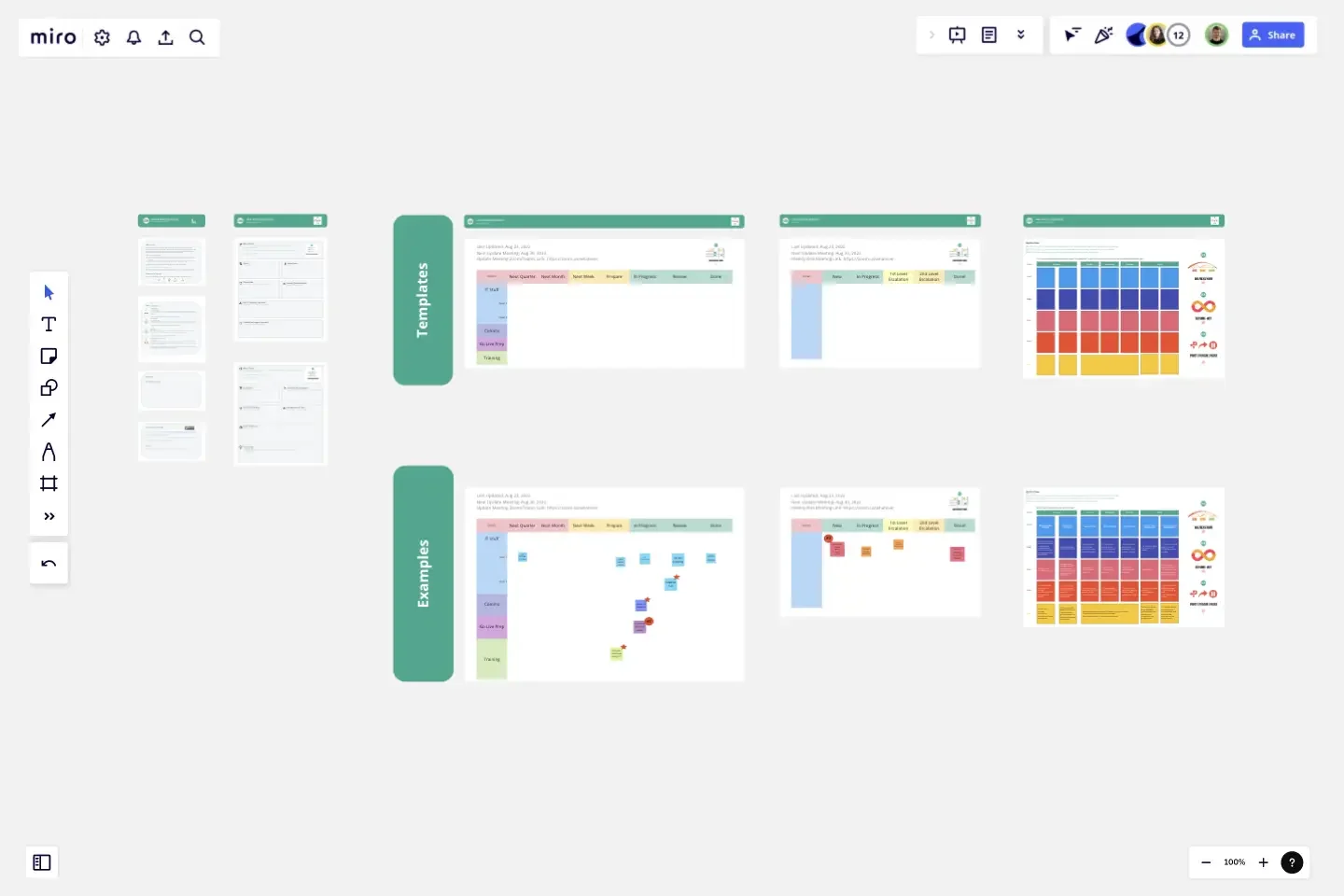Lean Change Self-Starter Kit
This template is for people who want to get started with Lean Change Management.
This template includes:
Two LCM Change Canvases
Two Big Visible Change Program Visualizations
MVP - A Minimum Viable Process to get you started
Change Canvases: We include a Storytelling Canvas and a Strategic Change Canvas with short instructions for how to use each section
Big Visible Walls: This is built using Miro's table element so you can customize the rows and columns for your context and workflow.
MVP: This is the simplest possible change management process you can have, along with tips for how to make the most of LCM out of the box!
This template was created by Lean Change.
Get started with this template right now.
Lean Inception Workshop
Works best for:
Agile, Lean Methodology
The Lean Inception Workshop streamlines project kickoff by aligning teams on goals, scope, and priorities. It leverages Lean principles to eliminate waste and maximize value, guiding exercises to define user personas, map user journeys, and prioritize features. By fostering cross-functional collaboration and customer-centric thinking, this template accelerates project initiation and ensures alignment between stakeholders, empowering teams to deliver customer value faster.
Lean Project Charter
Works best for:
Agile
The Lean Project Charter template provides a streamlined approach to defining project objectives, scope, and success criteria. It emphasizes clarity, brevity, and alignment with Lean principles, enabling teams to kickstart projects with focus and purpose. This template empowers teams to set clear goals, establish shared understanding, and align stakeholders, driving efficiency and effectiveness in project delivery. By promoting transparency and accountability, the Lean Project Charter sets the foundation for successful project execution and continuous improvement.
SIPOC Process Map
Works best for:
Agile Metodology
The SIPOC Process Map is a visual tool for documenting the high-level process flow of a system or project. It helps teams identify Suppliers, Inputs, Processes, Outputs, and Customers, facilitating a holistic understanding of the value stream. This template enables teams to visualize key process elements and interdependencies, empowering them to identify areas for improvement and optimize workflow efficiency. By promoting transparency and collaboration, the SIPOC Process Map empowers organizations to deliver value more effectively and satisfy customer needs.
Quick Retrospective Template
Works best for:
Education, Retrospectives, Meetings
A retrospective template empowers you to run insightful meetings, take stock of your work, and iterate effectively. The term “retrospective” has gained popularity over the more common “debriefing” and “post-mortem,” since it’s more value-neutral than the other terms. Some teams refer to these meetings as “sprint retrospectives” or “iteration retrospectives,” “agile retrospectives” or “iteration retrospectives.” Whether you are a scrum team, using the agile methodology, or doing a specific type of retrospective (e.g. a mad, sad, glad retrospective), the goals are generally the same: discovering what went well, identifying the root cause of problems you had, and finding ways to do better in the next iteration.
Iceberg Reflection
Works best for:
Agile
The Iceberg Reflection template is a visual tool for facilitating reflective exercises within Agile teams. It prompts participants to explore both visible and underlying aspects of challenges or successes, akin to an iceberg where only a portion is visible above the waterline. This template encourages deeper reflection and insights, fostering a culture of continuous improvement and learning. By addressing root causes and hidden factors, teams can better understand and overcome obstacles, driving growth and resilience.
A Halloween Retro
Works best for:
Retrospectives, Meetings, Agile Methodology
The Retrospective Halloween template offers a themed approach to retrospectives, perfect for the spooky season. It provides elements for reflecting on past iterations, identifying scary issues, and brainstorming solutions. This template enables teams to have fun while addressing serious topics, fostering creativity and collaboration. By promoting a playful yet productive atmosphere, the Retrospective Halloween empowers teams to tackle challenges, drive improvement, and strengthen team cohesion effectively.
